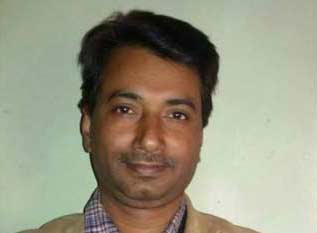Bihar-based journalist Rajdeo Ranjan may have been killed by "political mafia" because of his critical reporting, a fact-finding committee of the Press Council of India (PCI) has said in its report.
Alleged gangster and RJD leader Shahbuddin, who was recently released on bail, is under the scanner of investigation agencies in the murder case in Siwan district of Bihar.
The PCI has accepted the report of the fact-finding committee last week.
Another fact-finding report which the PCI accepted was regarding the murder of Jharkhand journalist Akhilesh Pratap Singh which suggested that he may have been killed over demand of money by a Naxalite group.
In a meeting held on September 9, the PCI, which is headed by Justice (retd) C K Prasad, also expressed concern over a spurt in criminal defamation cases against journalists and has decided to seek details of such cases from all states and Union territories.
In a statement released here, the PCI said that in the meeting, two separate Fact Finding Reports related to the murder of two journalists -- Raj Deo Ranjan, Bureau Chief, Hindustan, Bihar and Akhilesh Pratap Singh, a TV journalist from Chhatra, Jharkhand -- were accepted.
"The finding inter-alia suggested that Raj Deo Ranjan was killed by the political mafia because of his critical reportage and on the other hand, Akhilesh Pratap Singh though not perhaps had been murdered due to professional activities but may be due to demand of money by a Naxalite Group," the statement said.
Meanwhile, the Central Bureau of Investigation (CBI) today registered case in the murder of Rajdeo Ranjan and took over the investigation.
The case has again come into limelight as a photograph appeared of absconding suspects Mohammad Kaif and Mohammad Javed with Shahbuddin after his release from Bhagalpur jail on Saturday on bail granted by Patna High Court.
The Council sought suitable compensation for the families of the deceased and urged the respective state governments to take the corrective measure to ward off the "fear psychosis prevailing in the media."
Expressing concern over spurt in criminal defamation cases against journalists, the PCI said it has adjudicated 148 complaints of cases against the press and 38 complaints filed by the Press against the authorities.
It disposed of 558 matters on preliminary stage for default of mandatory requirements under the Press Council Act, 1978.
The PCI statement also gave details of the complaint of Union Minister for Women and Child Development Maneka Gandhi against the Editor, Reuters (India), New Delhi claiming publication of wrong and mischievous interpretation of an interview.
"The Council after due consideration of the grievance of the complainant is of the opinion that this is the interpretation of news agency and not the actual words used by the Minister and in fact, the news agency in the light of explanation offered by the complainant, came out with a clarification on the very next day of publication of the first news item," the PCI statement said.
It also said that in another complaint regarding the sedition case slapped against Tamil Weekly, "Namadhu Manasatchi", for publishing report on public health, the Council was of the prima facie opinion that it may be reflecting the true facts but notwithstanding that, the allegation made, does not come within the mischief of the offence of sedition.
"Since the matter is under investigation it advises the Investigation Officer to bear this in mind while making investigations and submitting the report in terms of Section 173 of the Code of Civil Procedure," the statement said.

